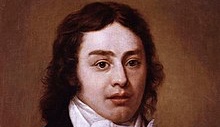Blogs
Coleridge in Love: The Two Saras

Coleridge in Love: The Two Saras
Samuel Taylor Coleridge had a theory on love
“Sympathy constitutes friendship; but in love there is a sort of antipathy, or opposing passion. Each strives to be the other, and both together make up one whole.”
Love, he felt, was generous. “I can neither retain my happiness nor my faculties unless I move, live and love in perfect freedom.” He wrote to his wife Sara.
That meant that his wife, must accept and love the people he loved, including Sara Hutchinson.
Sara was the younger sister of Wordsworth’s wife Mary. To Coleridge, the Hutchinson family and the Wordsworth family were inextricably linked. He wrote their initials in his notebooks, grouped together: W.W. M.H. D.W. S.H.
To him it was a privilege to be included in this close knit group, to have his initials on the stone they called the “Rock of Names”, William’s initials at the top, then MH for Mary Hutchinson, then Dorothy’s initials, Samuel’s, John Wordsworth’s and SH for Sarah Hutchinson at the bottom: a permanent memorial to a group of friends who belonged together forever.
Coleridge was always looking for a family, people to love him unconditionally, to accept and support him in the way he felt his wife did not.
The fact that Sara Hutchinson was Wordsworth’s sister-in-law was part of her attraction, of course. She was also quite different from Sara Coleridge, although physically they were similar, Sara Hutchinson having the same rounded womanly figure that Coleridge liked. Both women were out-going, optimistic and gregarious. But where Sara Coleridge was a city-born girl, who scarcely walked more than a few miles, Sara Hutchinson loved nothing more than the long walks in the countryside enjoyed so much by the Wordsworths, endlessly discussing poetry and philosophy and finding inspiration in nature.
Sara Coleridge was excluded from this group. With young children to look after she didn’t have time to join in with the long talks and the long walks or to sit and write up their poetry.
Coleridge couldn’t understand her jealousy. “No human being can have the right to be jealous.” He wrote to her. “That we can love but one person is a miserable mistake and the cause of abundant unhappiness.”
Coleridge had a special name for Sara Hutchinson: Asra.
“My love of Asra.” He wrote. “Is not so much in my soul as my soul in it…To bid me not love you were to bid me annihilate myself, for to love you is all I know of my life.”
The Asra he loved was the perfection of womanhood, an almost-mythologised version of a human being. But the real Sara Hutchinson was known to be forthright, out-spoken, self-opinionated even and it is possible that if Coleridge had been free to marry her he would have ended up, not with the meek, subservient wife he wanted, but with the same type of woman as Sara Coleridge.
As it was, Asra remained forever unattainable, part of her fascination being her sheer inaccessibility and her connection to the charmed Wordsworth circle.
Bethany Askew is the author of nine novels. Her two books Three Extraordinary Years: The Coleridges at Stowey and The Two Saras: Coleridge in Cumbria are available to buy from www.bluepoppypublishing.co.uk
Bethany Askew is the author of eight novels: The Time Before, The World Within, Out of Step, Counting the Days, Poppy's Seed, Three Extraordinary Years The Two Saras and I Know You, Don't I? She has also written a short story, The Night of the Storm, and she writes poetry. Two more women’s fiction books have been accepted for publication in 2020 and 2021 respectively and she is currently working on a new novel. In her spare time she enjoys reading, music, theatre, walking, Pilates, dancing and voluntary work. Bethany is married and lives in Somerset.
Recent Comments
- Bethany Askew on About the Author
- Louise Tyrrell on About the Author
- Bethany Askew on About the Author
- Yola Munro on About the Author
- Andrea crosland on About the Author
-
Latest Posts
Meta
Bethany Askew
Bethany Askew is the author of eight novels:
The Time Before, The World Within, Out of Step, Counting the Days, Poppy’s Seed, Three Extraordinary Years,The Two Saras and I know you, Don’t I?
She has also written a short story, The Night of the Storm, and she writes poetry.
Two more women’s fiction books have been accepted for publication in 2020 and 2021 respectively and she is currently working on a new novel.
In her spare time she enjoys reading, music, theatre, walking, Pilates, dancing and voluntary work.
Bethany is married and lives in Somerset.
-
My Twitter Feed
-
Today from Bethany Askew Novelist : Book Review: The Woman in the White Kimono by Ana Johns https://t.co/2J6L2spX7t... 4 years ago
-
Copyright - Bethany Askew 2009 - 2016 Follow @AskewBethany
